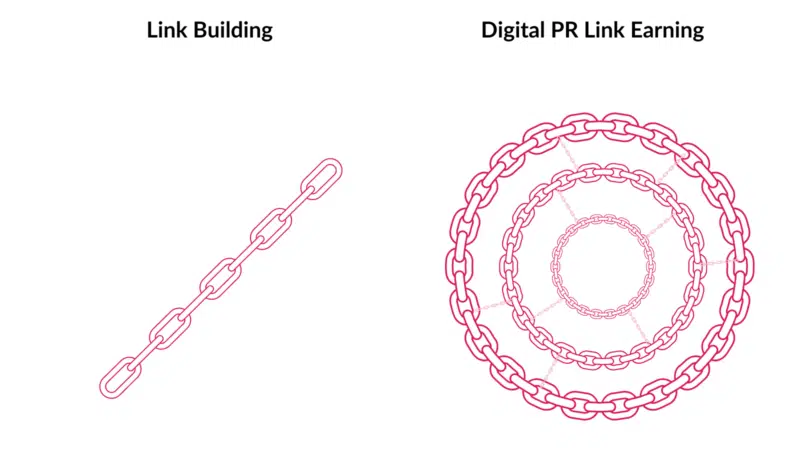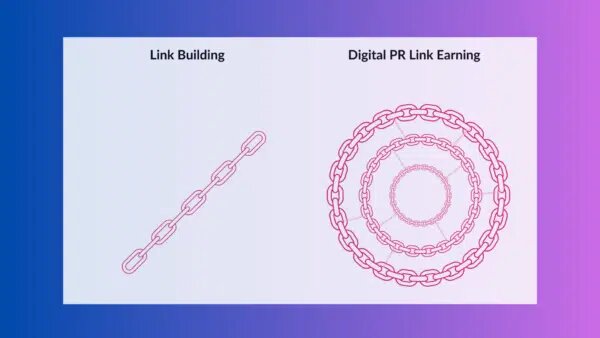Digital PR vs. manual link building: Adapting to the modern search landscape
Relationships are the new currency of the web. Discover why digital PR is overtaking manual link building in the age of semantic search.
“Links are the currency of the web.”
We’ve been told this for years, and to be fair, it was true.
But not any longer.
In this article, I’ll explain why manual link building is now less powerful and practical than digital PR.

Relationships: The new currency of the web
In recent years, Google has moved toward being a semantic search engine.
And while backlinks always will play a part, we know they play a lesser role thanks to the sheer power of Google’s knowledge graph and machine learning.
I find the best way to think about this is to view Google as a knowledge-hungry child.
In its infancy, it fed on links. And the more links, the better.
Today, it’s older and curious about the world around it. And it asks questions.
When it encounters a website, it tries to discover what the site is, who’s behind it and why it exists. And to do this, it looks at many ranking factors.
Links are one, but not in volume, but in context.
We’ve not evolved link building
Today, people still do much of the awful link building as we did 10 years ago.
- Many agencies still build links via guest posts.
- People still spam with mass outreach emails.
- And, tactics such as blog commenting are some people’s go-to.
The problem. These tactics don’t work well.
SEOs have recently been abandoning links in favor of content.
I’m sure you’ve seen the same case studies I have.
Huge fat graphs of traffic caused by the creation of hundreds or thousands of pages… without link building.
So, what’s going on?
Topical authority trumps bad links
When we see colossal traffic websites with little authority, they rank their sites using topical authority.
Or, in short. They’ve sold Google because they are experts in a single area. The proof of that expertise is displayed in knowledge.
But that, too, comes at a cost. Content doesn’t come cheap. Even with AI, you still have to have humans check and edit the content.
And reading a thousand pages of content takes time.
Unless you’re in the publishing or affiliate game, this traffic is essentially pointless. It’s too top-of-the-funnel to be of much use for brands or businesses.
So, we’re back in the links game.
Links are now relationships
Remember the concept of Google as a knowledge-hungry child?
Imagine a link as a way to find something. Our Google isn’t a toddler any longer. She’s at junior school and doesn’t want to find things; she wants to be told what things are and why they matter.
This is how I see the difference between digital PR link building and manual link building.
When we create links manually, we’re trying to game the system. Even deceive Google.
Through link building, we trick Google into thinking one page is better than others. Because at its heart, all link building attempts to manipulate the web rankings.
Google doesn’t like to be tricked. It wants honesty, and in a semantic search engine, that honesty comes as help.
We need to help Google better understand what a person, business or brand is.
Modern link building is all about educating Google. Every link should be a lesson that helps it form a mental relationship between entities.
This is a spoon. A spoon is used to eat. It is cutlery. So is a fork… you get the idea.
Natural links teach Google
When we link out naturally, we help our audience understand a subject better or give credit.
We’re expanding topics. This is education for search engines. It’s saying, “Hey, Google. This is a good site. Take a look.”
In this sense, natural links are like votes of confidence. They work much like links always have done.
And they occur naturally, in context, and it’s obvious to all in SEO when a link happens naturally.
Manual link building is supposed to replicate this because businesses can’t wait forever to be gifted with links.
And so, link building and buying became a multi-billion pound global industry.
In keeping with our Google child theory, link building or buying is like feeding Google with incorrect information.
There has to be another way.
There is.
Digital PR link earning: Why it matters
I’ve written about link earning vs. link building before. But I want to go deeper and present a more nuanced way of looking at this.
Digital PR backlinks are earned through data, expert commentary and or stories.
Be that journalists who need expert support with a story they are writing. Or something is happening worldwide, and we need experts to advise us.
And, when it comes to data, we collate information about the world and tell others a story about why this data matters.
Data is a record of what’s happening, and digital PR brings that data into our lives, so we can better understand the world around us.
In the hungry child world of Google, these links gained help to educate our search engine. They come from sites they trust. Websites that have authority in their eyes.
And these links get traffic virtually immediately, hitting the news and discovery feeds.
Google sees your link, but more importantly, it considers the relationship between the quote, comment or data and your business.
It understands that you’re an expert, and the media are confirming this.
The media are making the life of the search engine easier. They are helping it to make sense of the world and to understand what sites are, what they do and why they exist.
But, but, but…
People will read this and say, “But you don’t know this.”
And sure, that’s true. I could be talking rubbish.
I’m conceptualizing a complicated topic based on my experience, knowledge and what I see working out there.
And I could be wrong… dead wrong.
However, Google’s John Mueller also supports digital PR.
 100vw, 675px” data-lazy-src=”https://searchengineland.com/wp-content/seloads/2023/08/John-Mueller-tweet-on-Digital-PR.png.webp” /></figure>
</div>
<p>But is it better than manual link building?</p>
<h2 id=) Manual links still work… but it’s hard
Manual links still work… but it’s hard
I’ve been building links for a long time, and I’ve only given about three links out due to a manual outreach email.
That’s only about three links – out of thousands of emails I’ve received.
We’ve all received those replies that read like you’ve killed someone’s cat and not tried to get a link. Which leaves me scratching my head…why are we still doing it this way?
Why are we taking the long way around to links?
This is why link buying is so appealing, as are guest posts.
It’s easier, faster and more controlled.
Digital PR is equally tough. Links aren’t usually “dofollowed.” And often, all you get is a media mention.
But remember, we’re not in the links game. We’re in the relationships one, and Google can now read and understand context.
At our agency, we see that brand mentions alone can cause a lift in a website’s page rankings.
And the power of stories is that they travel. This is why, when a good story hits the press, it travels from news outlet to news outlet. Link explosions happen.
Some websites can’t use digital PR due to budget limitations or the nature of the site.
Some sites, the media won’t even touch with a 10-foot pole.
And so, link building will have its place.
But in modern search engines, the default for SEOs should be digital PR.


